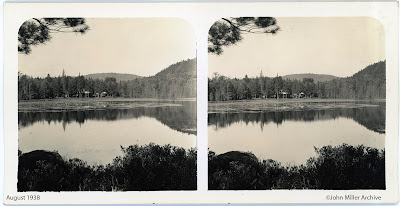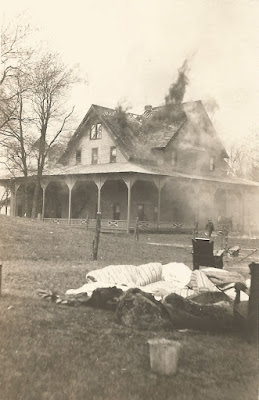Theodore H. Miller
 |
| The Miller family in 1923, Theodore on the left |
It all started with a chance Facebook message from a man in Wisconsin named John Miller. His message simply said he has some items that might be of interest to me as the historian of the Rap-Shaw Club. As it turned out what he has are dozens of photographs of the early Rap-Shaw Club taken by his great-grandfather, Theodore H. Miller. The photos date from 1908 until 1938. They show activities at the club camps, then located deep in the woods on the north side of the Beaver River [see my blog post of 5/16/21].
Theodore Miller [born 1872 – died 1971], was a self-taught mechanical engineer. He and his wife Florence MacDonald Miller [1881 – 1954] were the parents of three children: John MacDonald Miller, Elizabeth Lee Miller and Erik T. Miller. In 1903 they moved to Poughkeepsie, NY where Theodore became superintendent of the DeLaval Separator Company, a business that manufactured milking machines and machines that separate heavier from lighter liquids, used in the milk processing business.
Theodore Miller was a photography enthusiast. He owned a large format camera and also used a stereo camera with two lenses separated by the distance between the eyes. This type of camera produces two nearly identical images side-by-side. When viewed with a stereo viewer, the images merge to produce an apparently three-dimensional scene. Most of the photographs he took at Rap-Shaw are stereo photographs.
It's unclear how Theodore Miller found out about Rap-Shaw. So far as I can tell from existing club records, he was not a member. Most likely he visited as a guest of a member from Buffalo because his hunting photographs often included members from that city. Judging from the dates on the backs of his photos he was present for deer hunting in October 1908, fishing in May 1909, hunting in November 1926, November 1927, October 1928, October 1929, and for a late summer vacation in August 1938.
His earliest photos from 1908 and 1909 were taken with an ordinary large format camera. To my eye the most interesting of these is dated Oct. 28, 1908 and features six proud hunters posing on the shore of Witchhopple Lake where the club was located in those days. On the right stand the three club guides of the time: Jay Smith, Jimmy Wilder, and Carl McCormick. Fourth from the left stands perhaps the first woman ever to hunt deer at Rap-Shaw. Unfortunately, Miller did not record her name.
Miller came to Rap-Shaw every fall for hunting between 1926 and 1929. He took stereo photographs on every trip. He appears not to have come again until August 1938. During that trip he photographed the Beaver Dam Pond camp. These are probably the last photos of that camp since it burned down the next spring.
True history buffs may know that two of the children of Theodore and Florence Miller led quite interesting lives.
Captain John MacDonald Miller [1905 – 2008] is the grandfather of the John Miller who provided me with the photographs. He was a well-known aviator. He began flying in 1923 when he was 18. During the 1920s and 30s he often gave demonstration plane rides and performed as a barnstormer. He became a commercial airline pilot in 1938, serving until 1965. He also worked as a test pilot for the Autogyro, an early helicopter. He used one in 1939 to make the first commercial air mail delivery. Three of the planes Capt. Miller flew are on exhibit at the National Air & Space Museum in Washington, D.C.
Elizabeth ‘Lee’ Miller [1907 – 1977] became a model for Vogue in the 1920s. She went on to study photography with the artist Man Ray in Paris, becoming his collaborator and sometimes model. During World War II she worked on the front lines as a credentialed photojournalist. She famously documented the horrors of the Nazi death camps. Her photographs were carefully framed to evoke strong emotions using her unique combination of journalism and art. After the war she married British surrealist painter Roland Penrose.






Comments
Post a Comment